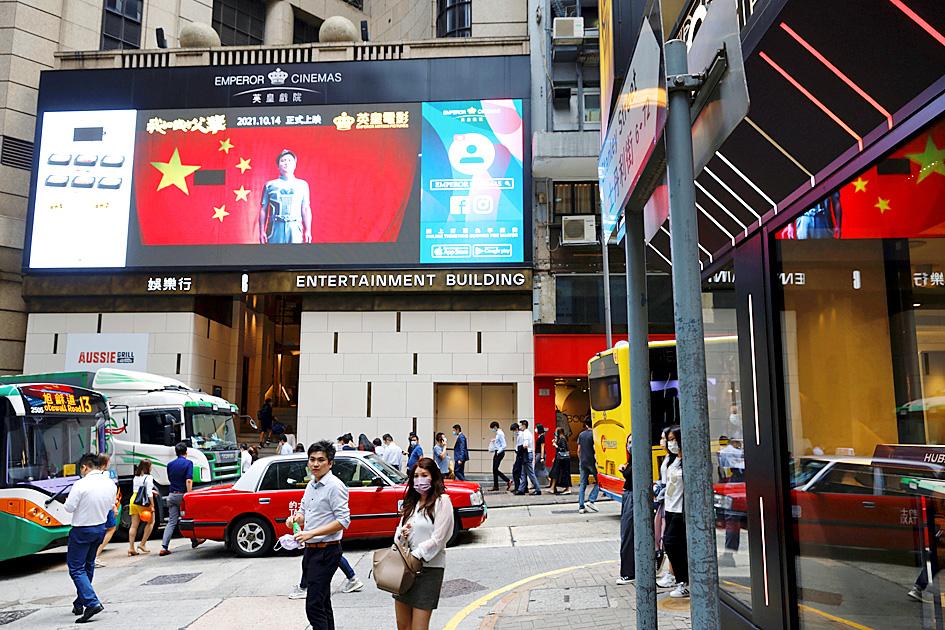Hong Kong yesterday banned films that run contrary to the interests of its National Security Law, the latest crackdown on freedom of expression in the territory.
The Hong Kong Legislative Council amended the Film Censorship Bill, turning movie censors into gatekeepers of the law with penalties as high as HK$1,000,000 (US$128,569) and three years in prison for those who screen non-approved content.
Inspectors can search without a warrant a premises showing a film, including company offices or a private members’ club, and the Hong Kong Film Censorship Authority can demand more information about screenings.

Photo: Reuters
Questions hang over how the changes will affect streaming services such as Netflix Inc, which offers a documentary on right advocate Joshua Wong (黃之鋒) in Hong Kong.
Netflix declined to comment, while Vimeo Inc, Amazon.com Inc and Apple Inc did not reply to questions about the changes.
“It is a treacherous climate for businesses having to make content decisions,” said Darrell West, senior fellow at the Center for Technology Innovation at the Brookings Institution.
The changes are part of a wider legal assault on the freedom of expression and information once prized in the former British colony, but severely reduced in mainland China.
Hong Kong Chief Executive Carrie Lam (林鄭月娥) said that the Legislative Council had “delivered a brilliant performance,” as all of the political opposition had either been arrested, disqualified or resigned after Beijing mandated that national security officials approve candidates.
“They have done really well in terms of legislative amendments and proposals,” Lam said in a regular news briefing on Tuesday.
Baking such censorship into law were “dictatorial maneuvrings designed to undermine a vibrant Hong Kong film culture,” said Joseph Tse-Hei Lee (李榭熙), director of the Global Asia Institute at Pace University in New York, who has published two papers on Hong Kong cinema.
After decades producing global movie stars such as Tony Leung (梁朝偉), some in the film industry worried that the amendments signaled the “death of Hong Kong cinema,” Lee said.
“It is hard to imagine how film directors, executive producers and actors could stay politically neutral because China’s definition of politics focuses narrowly on any opinion and action thought to be a security threat,” he said.

Right-wing political scientist Laura Fernandez on Sunday won Costa Rica’s presidential election by a landslide, after promising to crack down on rising violence linked to the cocaine trade. Fernandez’s nearest rival, economist Alvaro Ramos, conceded defeat as results showed the ruling party far exceeding the threshold of 40 percent needed to avoid a runoff. With 94 percent of polling stations counted, the political heir of outgoing Costa Rican President Rodrigo Chaves had captured 48.3 percent of the vote compared with Ramos’ 33.4 percent, the Supreme Electoral Tribunal said. As soon as the first results were announced, members of Fernandez’s Sovereign People’s Party

MORE RESPONSIBILITY: Draftees would be expected to fight alongside professional soldiers, likely requiring the transformation of some training brigades into combat units The armed forces are to start incorporating new conscripts into combined arms brigades this year to enhance combat readiness, the Executive Yuan’s latest policy report said. The new policy would affect Taiwanese men entering the military for their compulsory service, which was extended to one year under reforms by then-president Tsai Ing-wen (蔡英文) in 2022. The conscripts would be trained to operate machine guns, uncrewed aerial vehicles, anti-tank guided missile launchers and Stinger air defense systems, the report said, adding that the basic training would be lengthened to eight weeks. After basic training, conscripts would be sorted into infantry battalions that would take

GROWING AMBITIONS: The scale and tempo of the operations show that the Strait has become the core theater for China to expand its security interests, the report said Chinese military aircraft incursions around Taiwan have surged nearly 15-fold over the past five years, according to a report released yesterday by the Democratic Progressive Party’s (DPP) Department of China Affairs. Sorties in the Taiwan Strait were previously irregular, totaling 380 in 2020, but have since evolved into routine operations, the report showed. “This demonstrates that the Taiwan Strait has become both the starting point and testing ground for Beijing’s expansionist ambitions,” it said. Driven by military expansionism, China is systematically pursuing actions aimed at altering the regional “status quo,” the department said, adding that Taiwan represents the most critical link in China’s

‘REALLY PROUD’: Nvidia would not be possible without Taiwan, Huang said, adding that TSMC would be increasing its capacity by 100 percent Nvidia Corp CEO Jensen Huang (黃仁勳) on Saturday praised and lightly cajoled his major Taiwanese suppliers to produce more to help power strong demand for artificial intelligence (AI), capping a visit to the country of his birth, where he has been mobbed by adoring fans at every step. Speaking at an impromptu press conference in the rain outside a Taipei restaurant, where he had hosted suppliers for a “trillion-dollar dinner,” named after the market capitalization of those firms attending, Huang said this would be another good year for business. “TSMC needs to work very hard this year because I need a lot